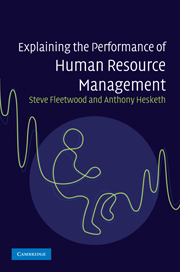Book contents
- Frontmatter
- Dedication
- Contents
- List of figures
- List of tables
- Preface
- Acknowledgements
- Part I HRM and organisational performance today
- Part II Meta-theorising the HRM–P link
- 3 The state of contemporary research on the HRM–P link
- 4 Scientism
- 5 Prediction, explanation and theory
- 6 Critical realism
- Part III Reflexive performance
- Notes
- Bibliography
- Index
3 - The state of contemporary research on the HRM–P link
a technical analysis
Published online by Cambridge University Press: 05 July 2014
- Frontmatter
- Dedication
- Contents
- List of figures
- List of tables
- Preface
- Acknowledgements
- Part I HRM and organisational performance today
- Part II Meta-theorising the HRM–P link
- 3 The state of contemporary research on the HRM–P link
- 4 Scientism
- 5 Prediction, explanation and theory
- 6 Critical realism
- Part III Reflexive performance
- Notes
- Bibliography
- Index
Summary
Introduction
Current empirical research on the HRM–P link is orientated around two key ideas. The first idea is that of a presumed link, association or empirical relation between HRM practices and organisational performance. Legge (2001: 23) is not exaggerating when she refers to ‘the search for the Holy Grail of establishing a causal link between HRM and performance’. This link is conceptualised in various ways. It is presumed to exist directly or indirectly (via mediating variables/mechanisms) between (a) an HRM practice or perhaps more plausibly a bundle of practices when (horizontally) integrated or aligned with one another; possibly when these practices are (vertically) aligned or integrated with corporate strategy; possibly when all this occurs in an appropriate context which may possibly involve a range of stakeholders, and (b) organisational performance. Whilst this is an accurate way of putting matters because it includes the various ways in which the link has been conceived, it is also rather convoluted. For ease of exposition, therefore, we refer simply to the link between HRM practices and organisational performance, yet always have in mind this more accurate conception. Second, this link is presumed to be quantifiable and measurable with appropriate metrics, and discovered using the usual range of quantitative, empirical and statistical research techniques. Whether these phenomena are measured at the level of the firm, business unit or individual makes no difference to our argument, and we leave this out of consideration.
The aim of this chapter is to elaborate, at some length, what this current research involves and, more importantly, the problems it faces – which are often referred to generically as the problem of under-theorisation. Whilst some of those who study the HRM–P link recognise empirical research is under-theorised, we are not aware of any who are prepared to take the problem seriously, or of any who are willing to consider just how deep it runs. And we think the problem runs so deep as to seriously undermine the whole paradigm.
- Type
- Chapter
- Information
- Explaining the Performance of Human Resource Management , pp. 63 - 114Publisher: Cambridge University PressPrint publication year: 2010



